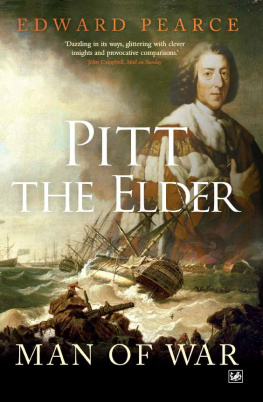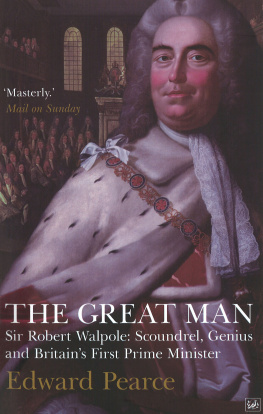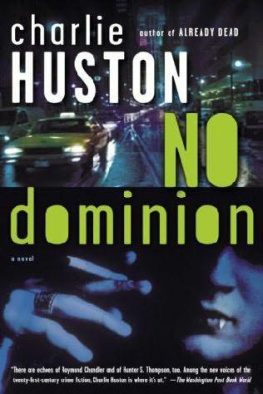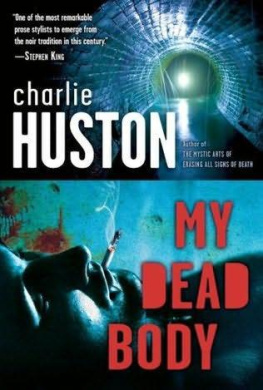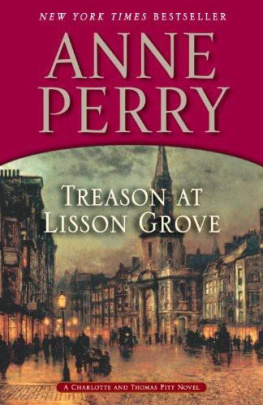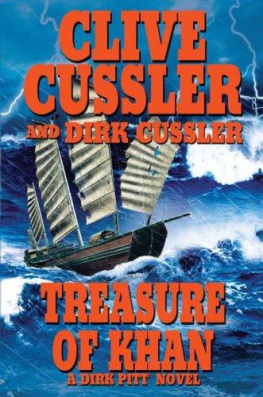Contents
About the Book
This remarkable book opens at the dawn of the British Empire with the great sea battle at Quiberon Bay where French ships, intended for the 1759 invasion of Britain, are chased, caught and defeated by a fleet commanded by Admiral Sir Edward Hawke. In this momentous victory Britain effectively settled the outcome of the Seven Years War and established itself as the worlds dominant imperial power.
At the heart of the conflict with France was William Pitt, the first Earl of Chatham and Britains future Prime Minister. Weaving together military history and political biography Edward Pearce provides a portrait of the man with an eye like a diamond a man who had close ties with the slave trade and who preached war and British supremacy on a world stage. Alongside detailed descriptions of battles in Europe and North America we follow Pitts career as a politician one that was closely intertwined with General James Wolfe at Quebec; American independence; the slow mind of George III and the quick one of the rake and outsider John Wilkes.
Posterity has invested Pitt with a mystique presented him as heroic, a titan, a brilliant statesman and military strategist. Edward Pearce scruitinises the reputation and investigates the extent to which Britains victories and imperial advances can be credited to Pitt alone or to a coalition of commanders, naval administrators and foreign allies such as Frederick the Great of Prussia. He also shows us Pitt the man vain, ruthless, tortured with physical illness, succumbing to mental collapse.
Pitt the Elder is a masterful portrait of arguably the most powerful minister ever to guide Britains foreign policy and of an age which marked a new epoch in history, when the balance of power in Europe and the world was set for almost two centuries.
About the Author
Edward Pearce is a political journalist and author. He has been a leader writer for the Daily Express, a Commons sketch writer and leader writer for the Daily Telegraph, a columnist for the Sunday Times and the Guardian, and sketch writer for the New Statesman. He also writes regularly for the Yorkshire Post, and was a panellist on BBC Radio 4s The Moral Maze. His books include The Lost Leaders (about three near-Prime Ministers), Lives of Most Resistance (about English Resistance to Irish Home Rule), Denis Healey (the authorised biography), Reform! (about the 1832 Act) and The Great Man (about Sir Robert Walpole). He is married to Deanna with whom he has a daughter, Cecily.
Also by Edward Pearce
The Senate of Lilliput
Hummingbirds and Hyenas
Looking Down on Mrs. Thatcher
The Shooting Gallery
The Quiet Rise of John Major
Election Rides
Machiavellis Children
The Lost Leaders: The Best Prime Ministers We Never Had
Lines of Most Resistance: The Lords, the Tories and Ireland
18861914
Denis Healey: A Life in Our Times
Reform! The Fight for the 1832 Reform Act
The Diaries of Charles Greville
The Great Man: Sir Robert Walpole Scoundrel, Genius and
Britains First Prime Minister
PITT THE ELDER
Man of War
EDWARD PEARCE
Introduction
This account of the Elder Pitt as Man of War was not conceived as a matching bookend to The Great Man, the life of Robert Walpole, published in 2007. It derives from the revisionist tendency across thirty-five years which has approached Pitt/Chatham in hard detail and viewed him far more astringently than earlier rhapsodic judgements.
Paul Langford, in the bibliography to his authoritative mid-eighteenth-century volume of the Oxford History of England, A Polite and Commercial People, makes an important judgement. Pitts Bubble has remained unpricked though it has shrunk somewhat under the meticulous inspection of Marie Peterss Pitt and Popularity.
One must add that the factional aspect of Pitt, his obligations to a ferocious commercial lobby and its newspapers, the shifts, contradictions and silent climb-downs of his career have been lit as sharply by Richard Middletons The Bells of Victory and by two outstanding Oxford D.Phil. theses by E. J. S. Fraser and Michael Durban. There then followed Marie Peterss fine full-dress biography of a decade since.
The bubble, and it was a glittering one, exists in the awestruck 1827 biography by the Rev. Francis Thackeray, then flew still inflated throughout the imperial era, down to last-century works by Basil Williams and O. A. Sherrard. Within it, Pitt shimmers. Received opinion proclaims him the incomparable man, the driving vital patriot who knew that he could save this country and that nobody else could, a hero among cowardly bumblers, the visionary of empire, the director of war.
Received opinion had been received from Pitt. It took him at his word, ignored the collective nature of government action, ignored the impossibility of any minister, in an age of sauntering communication, telling any admiral or general how to win a war. The grandiose reputation has surely shrunk in the twenty years since Langfords quietly deadly judgement. Accordingly, this life has been written to reflect for a wider public upon the downward drift of historians judgement of the Great Commoner and Patriot Minister.
To do this I have also returned to the major primary sources. Outstanding here are those in the secretary hand of the Duke of Newcastles amanuensis, John Stone, and printed collections of letters like those discovered in the 1930s by Lewis Namier and Romney Sedgwick which display Pitt approaching the abhorred Lord Bute with startling reverence. I have also had the interesting experience of reading the North Briton, John Wilkess astonishingly virulent, Scot-allergic journal, far rougher, if far better written, than any contemporary anthology of red-top opinion. Thanks to great finds in the 1980s, we now have the record kept by the 4th Duke of Devonshire, enlightening about Pitt and the duke.
There was no Hansard at this time, but Cobbetts History of Parliament, a compendium of notes taken at the time for pamphlet, magazine and newspaper use, does the vivid service equally important in writing my life of Sir Robert Walpole. After a general pursuit of the evidence, I can see no alternative view of the first Lord Chatham except revision and ironically a return to the older dryer scepticism the letters of Edmund Burke and the still penetrating Essays of Lord Macaulay. Pitt was an able man, an eloquent speaker and a compelling presence, but so very much the creature of personality and its attendant publicity.
However the reputation of this period for excitement, heroic and tragic conflict is not diminished. Wolfe is a brilliant hero yet. Admiral Hawke is the superlative sailor of record, probably the indispensable man of this war. So, since the centrepiece of Pitts life was the Seven Years War, I have gone out of my way to write a military history in parallel with the political one. We open with a brief taste of the great naval victory of Quiberon Bay, related in full during the subsequent narrative. The misfortunes at Minorca of Poor Mr Byng, shot on his quarterdeck for over-caution, are here, as are James Wolfe and Quebec. But so too are the great battles in Germany involving Ferdinand of Brunswick and the genial, public house-establishing Marquess of Granby.
Next page
